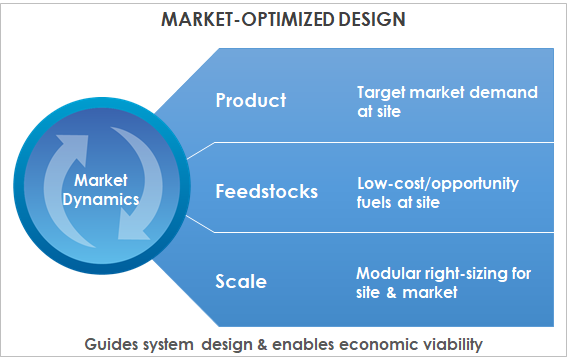Market-optimized Design for Modular Gasification-based Energy Conversion Plants
by Rudy P. SysAdmin at howtofindthemoney
Market-Optimized Design concerns designs and strategies for modular gasification-based energy conversion plants, which can be flexibly right-sized, configured and sited for local coal, waste coal and coal fines, and biomass blending for feedstock conversion to high-value marketable products. Modular coal gasification systems could create a synergism of co-utilizing low-cost opportunity feedstocks to synthesize products targeted to local market dynamics.
Philosophy
The philosophy of market-optimized design is to use coal more efficiently to create more valuable end products from coal and other opportunity feedstocks, by careful considering the market viability of a given plant concept. With the reality that coal-based power must compete with other power generation options in terms of cost, efficiency, and environmental performance, conventional large-scale power generation may not easily compete in the broader marketplace. However, there may be unique opportunities for modular coal-based plants, e.g. in coal-producing regions suffering economic distress, and in locations having high imported fuel costs.
Strategy
The fundamental strategy in this area is to evaluate designs for modular coal conversion/syngas-based systems, with primary focus on siting, sizing and otherwise tailoring modular plants for market viability. With this approach, the program can explore economically viable possibilities of modular gasification/conversion of coal to allow distributed electricity generation, fuels and chemicals production, or combinations thereof (polygeneration). Modular implementations would reduce capital investment, allow access to niche markets, and permit flexibility in siting to take advantage of low-cost local feedstock availability and labor pools.
Location-Specific Studies
Field studies are underway for pilots in Alaska and eastern Kentucky to spearhead new coal industry growth, consistent with the ideas of market-optimized design:
Making Coal Relevant for Small Scale Applications: Modular Gasification for Syngas/Engine CHP Applications in Challenging Environments — The University of Alaska-Fairbanks is preparing a Front-End Engineering and Design (FEED) study for a modular, air-blown fixed-bed gasifier providing clean coal-derived syngas to an existing diesel engine generator, resulting in capital and operating-cost estimates for power generation using small-scale, modular, coal gasification units coupled with readily obtained diesel infrastructure, suitable for deployment at remote sites and providing a way to obtain fuel locally utilizing Alaska’s indigenous coal resources instead of importing diesel fuel at high cost.
Gasification CHP from Coal Fines — The University of Kentucky is working on a FEED study for a 5-MW-electrical-equivalent polygenerating unit located in Hazard, eastern Kentucky, using waste coal fines and biomass (sawdust from the lumber industry) as exceptionally low-cost feedstocks. The idea is to develop a cross-industry synergy in a rural, remote area that could serve as a model for future economic development in depressed regions.
Microbially enhanced coal bed methane processes
NETL’s Research & Innovation Center (R&IC) is investigating enhancing coal-to-methane conversion of unmineable coal beds utilizing the naturally occurring subsurface microbial community. This simplifies above ground processes by reducing the balance-of-plant operations and costs, and converts an unusable resource into a viable energy source. Such processes tie into the market-optimized design area, as they would be specifically located at unmineable coal seams, and would depend on suitable market factors coming into play for their possible implementation. R&IC’s sequenced approach leading to actual field demonstration is as follows:
- Assess geochemistry and microbiology of core and fluid samples obtained from the Appalachian coal basin to define pathways for stimulation experiments.
- Test nutrient and oxidant amendments on obtained samples at ambient conditions.
- Develop a coal conversion stimulation strategy capable of doubling the methane production demonstrated at subsurface conditions.
- Secure a field testing site, and test coal conversion strategies in situ at a relevant coal seam environment.
Also, NETL has funded outside work in this area, including several projects conducted by academia. One such project has been performed by Montana State University, developing technology to enable coal bio-conversion testing in the field: Optimization, Scale-up, and Design of Coal-Dependent Methanogenesis in Preparation for In Situ Field Demonstration
Systems Analyses
As part of the support for the Syngas Processing key technology, studies are being conducted to provide unbiased comparisons of competing technologies, determine the best way to integrate process technology steps, and predict the economic and environmental impacts of successful development.
Recently Completed Projects
- A Scaling Study of Microbially-Enhanced Methane Production from Coal (MECBM): Optimizing Nutrient Delivery for Maximized Methane Production
- Alstom's Limestone Chemical Looping Gasification Process for High Hydrogen Syngas Generation
- Increasing the Rate and Extent of Microbial Coal to Methane Conversion through Optimization of Microbial Activity, Thermodynamics, and Reactive Transport
- Ceramic Proppant Design for In-Situ Microbially Enhanced Methane Recovery
- Optimized Microbial Conversion of Bituminous Coal to Methane for In Situ and Ex Situ Applications
The 10 largest coal producers and exporters in Indonesia:
Sponsor Ads
Created on Jul 19th 2019 00:58. Viewed 547 times.
Comments
No comment, be the first to comment.



